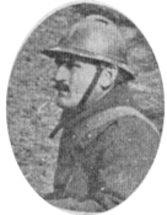Sld
Xavier Charles Bosmans
Information about birth
|
Date of birth: 22/01/1888 |
|
Place of birth: Wolfersdorf, Oberelsass, Reichsland Elsaß-Lothringen, German Empire |
General information
|
Last known residence: Petit-Enghien, Hainaut, Belgium |
|
Profession: Cotton Dyer |
Army information
|
Country: Belgium |
|
Force: Belgian Army |
|
Rank: Private Second Class |
|
Service number: 131/63134 |
|
Units: — 2/III/1e regiment karabiniers - 2/III/1er régiment de carabiniers (Last known unit) |
Information about death
|
Date of death: 29/09/1918 |
|
Place of death: Hill 52, Passchendaele, Belgium |
|
Cause of death: Killed in action (K.I.A.) |
|
Age: 30 |
Cemetery
|
Belgische militaire begraafplaats Houthulst Plot: N1 Row: / Grave: 1212 |
Points of interest 3
| #1 | Place of birth | ||
| #2 | Last known residence | ||
| #3 | Place of death (approximate) |
My story
Xavier Charles Bosmans, was killed on 29 September 1918, during the second day of the Final Offensive. He left behind a widow.
Xavier was born in 1888 in Wolfersdorf in Alsace-Lorraine, which had been part of the German Empire since 1871. He was the eldest son of Charles Romain Bosmans and Therese Raoul. In 1914, Xavier enlisted in the Belgian army, working as a dyer and living in Petit-Enghien in Hainaut.
For four years, Xavier shared the ups and downs of the Belgian army. The endless retreat, the guard at the Yser and finally the great liberation offensive that erupted on 28 September 1918. The then 30-year-old Xavier was private second class in the 2nd Company of the 1st Battalion, 1st Regiment Carabiniers.
At 5.30am, Xavier's unit along with the 2nd and 3rd Carabiniers attacked Westrozebeke and the heights north of Passchendaele. By noon they were on the ridge. Here a pause was taken, to allow the artillery to take up forward positions. The infantry could take a breather. But the Germans also took advantage to reorganise. When the attack was resumed, the Belgians met stiff resistance.
The next day, after a brief artillery bombardment, the offensive resumed. In clammy uniforms with heavy legs, the men began the attack. As the last Germans retreated from Passchendaele, the Carabiniers were checked by machine-guns near Westrozebeke, which remained in German hands until the end of the day.
Xavier would not live to see the breakthrough. He fell on 29 September and was initially buried on Hill 52 between Westrozebeke and Passchendaele. He was later interred at the German Ehrenfriedhof "Wallemolen" No 104. In 1923 he found his final resting place in the Belgian military cemetery of Houthulst.
Xavier was born in 1888 in Wolfersdorf in Alsace-Lorraine, which had been part of the German Empire since 1871. He was the eldest son of Charles Romain Bosmans and Therese Raoul. In 1914, Xavier enlisted in the Belgian army, working as a dyer and living in Petit-Enghien in Hainaut.
For four years, Xavier shared the ups and downs of the Belgian army. The endless retreat, the guard at the Yser and finally the great liberation offensive that erupted on 28 September 1918. The then 30-year-old Xavier was private second class in the 2nd Company of the 1st Battalion, 1st Regiment Carabiniers.
At 5.30am, Xavier's unit along with the 2nd and 3rd Carabiniers attacked Westrozebeke and the heights north of Passchendaele. By noon they were on the ridge. Here a pause was taken, to allow the artillery to take up forward positions. The infantry could take a breather. But the Germans also took advantage to reorganise. When the attack was resumed, the Belgians met stiff resistance.
The next day, after a brief artillery bombardment, the offensive resumed. In clammy uniforms with heavy legs, the men began the attack. As the last Germans retreated from Passchendaele, the Carabiniers were checked by machine-guns near Westrozebeke, which remained in German hands until the end of the day.
Xavier would not live to see the breakthrough. He fell on 29 September and was initially buried on Hill 52 between Westrozebeke and Passchendaele. He was later interred at the German Ehrenfriedhof "Wallemolen" No 104. In 1923 he found his final resting place in the Belgian military cemetery of Houthulst.
Sources 2
|
Etat Civil 1793-1892 (Archives Départementales Du Haut-Rhin, Colmar (ADHR)). https://archives.haut-rhin.fr/ Sources used |
|
Marcel Weemaes, Van de IJzer tot Brussel: Het Bevrijdingsoffensief van het Belgische Leger 28 september 1918 (Marcinelle, Maison d'Edition, 1972). Sources used |
More information 2
|
Belgian War Dead Register https://www.wardeadregister.be/nl/dead-person?idPersonne=4253 |
|
Namenlijst (In Flanders Fields Museum) https://namenlijst.org/publicsearch/#/person/_id=F9A71E02-747D-11D4-AAFC-E6A483E88549 |
